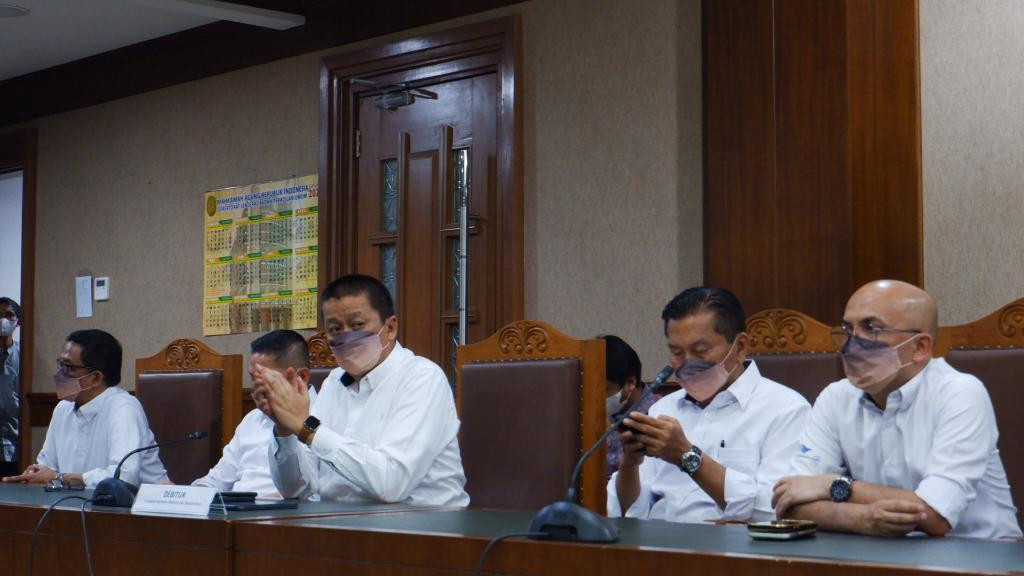Popular Reads
Top Results
Can't find what you're looking for?
View all search resultsPopular Reads
Top Results
Can't find what you're looking for?
View all search resultsCreditors approve Garuda’s restructuring plan
With the approval, Garuda estimates it can slash its liabilities by between 80 and 81 percent, as the proposal allows the airline to convert its obligations to $825 million in new bonds with maturity periods of nine years and $330 million in new equity.
Change text size
Gift Premium Articles
to Anyone
G
aruda Indonesia has won by a landslide a vote on its proposal to restructure Rp 142 trillion (US$9 billion) of its liabilities, allowing the flag carrier to avert bankruptcy and live to fight another day.
The proposal was approved by more than 95 percent of the creditors and lessors attending – physically or virtually – a poll at the Central Jakarta District Court on Friday, a team of debt suspension case (PKPU) administrators appointed by the court announced, adding that the result would be ratified by the court on Monday.
With the approval, Garuda estimates it can slash its liabilities by between 80 and 81 percent, as the proposal allows the airline to convert its obligations to $825 million in new bonds with maturity periods of nine years and $330 million in new equity. The former was increased from a previously planned $800 million.
In addition, loans from state-owned lenders would be converted to new ones with a maturity of 22 years and an annual interest of 0.1 percent.
The proposal includes many other measures and states that liabilities up to Rp 255 million would be repaid directly.
Different measures will have their own effective implementation dates but no later than Dec. 31, according to the restructuring plan.
Garuda Indonesia CEO Irfan Setiaputra said the airline would direct its focus to domestic passenger and cargo services while being more selective with international flights by choosing only profitable routes. Garuda will also refrain from having too many aircraft types.
“We want to make sure that Garuda can make a profit in the future,” Irfan told reporters on Friday.
Creditors’ approval comes amid the fact that Garuda was already technically bankrupt, with the State-Owned Enterprises (SOE) Ministry saying in November last year that it would not survive without a debt cut.
The government has been readying Pertamina subsidiary Pelita Air to replace Garuda.
According to the Transportation Ministry, Garuda Indonesia, including Citilink, held nearly a third of the country’s domestic air travel.
Despite securing approval from the vast majority of creditors, the airline is aware that numerous lessors and creditors have so far refrained from backing the proposal. Among them is aircraft producer Boeing, to which Garuda owes $822 million.
Harold Tjiptadjaja, Garuda’s financial advisor from Mandiri Securities, said on Friday that Boeing, along with other creditors not participating in the PKPU, would have 30 days after the court ratified the PKPU result to enter the restructuring plan while accepting its terms and conditions.
If Boeing fails to do so, Harold estimates that Garuda’s new debt issuance could be lower than outlined in the proposal.
Irfan said the airline was now eligible to receive a Rp 7.5 trillion state-capital injection, which the SOE Ministry and Finance Ministry had made conditional upon creditors’ approval to restructuring.
According to SOE Ministry presentation material, the airline will conduct two rights issues; the first for the state capital injection and the second to raise a $330 million from new investors. The government will ensure that its stake in Garuda will be at least 51 percent.
Jakarta-based aviation expert Gerry Soedjatman told The Jakarta Post on Saturday that Garuda was not yet out of the woods, arguing that the airline still had a lot of “homework” to do.
“Garuda’s survival is still at risk,” he said.
Gerry noted that Garuda’s fight services had shrunk to the point that it would be difficult for the airline to generate enough income to sustain operations, following a decline of its fleet during the debt restructuring process.
He estimates that the company’s fleet had dropped to between 30 and 40 planes, half the number required for its new business plan. Even once the required fleet is achieved, it would take another six to 12 months for the airline to become profitable, Gerry said.
Moreover, uncertainty remained high, he warned, explaining that authorities were bracing for the possibility of another wave of COVID-19 infections and for a prolonged period of high oil prices, both of which could hamper the industry’s recovery.










